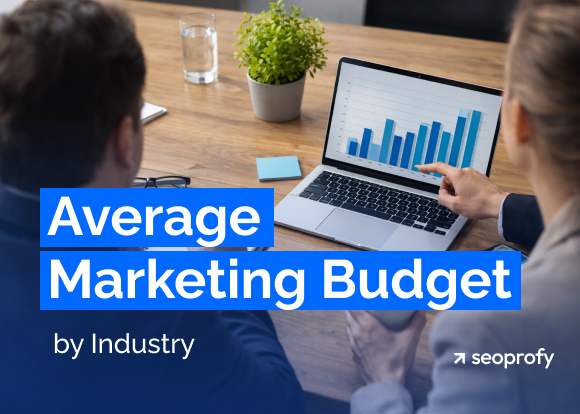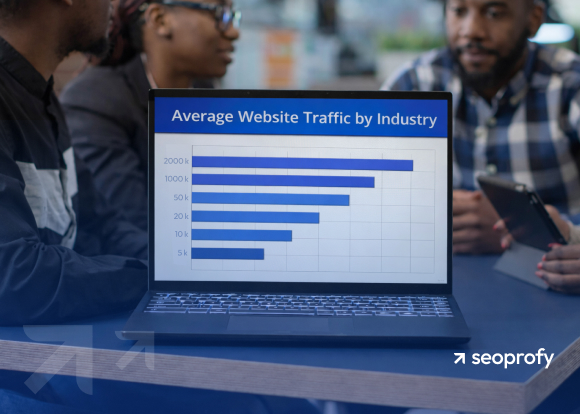A successful SEO campaign will enable you to rank higher, drive more organic traffic, and even increase your sales. But to reach those results, you’ll first have to create a data-driven strategy.
You might have already tried adding relevant keywords to your pages or asking other websites to link back to yours, which is a good start. But do you know how to build a strategy that turns SEO into a consistent driver of results? In this article, we will walk you through how to set up an effective SEO campaign that can succeed in the long term.
- The starting point of any SEO campaign is understanding the site’s current state and defining priorities for growth.
- With a technical SEO audit, you can find and fix issues that may prevent search engines from crawling and indexing your site.
- Creating high-quality and valuable content helps you get better rankings and engagement.
- Tracking KPIs throughout the campaign keeps your efforts on track and shows where to make adjustments.
What Is an SEO Campaign?
An SEO campaign is a strategic plan to lift a website’s visibility in Google’s search results and turn that visibility into qualified leads and stronger ROI. It aims to achieve better rankings for queries with business potential and steady organic traffic that converts.
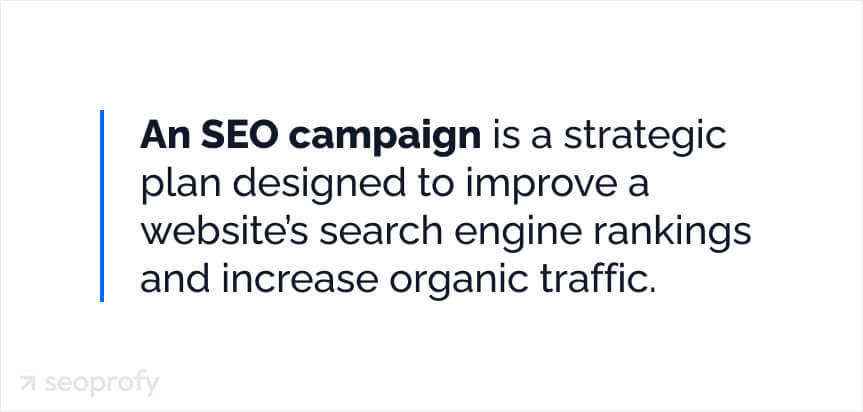
A campaign often includes research of relevant keywords, creation of content around high-value topics, and acquisition of backlinks from relevant and trusted websites. One of the biggest advantages of a well-planned SEO campaign is that it creates lasting visibility and a consistent flow of leads without paying for each click.
Create a Successful SEO Campaign in 9 Steps
Here’s the SEO checklist you can follow to build an effective SEO campaign for your business:
- Set clear goals
- Conduct keyword research
- Complete an SEO audit
- Perform competitor analysis
- Identify technical issues
- Create valuable content
- Improve on-page SEO
- Build backlinks
- Track your progress
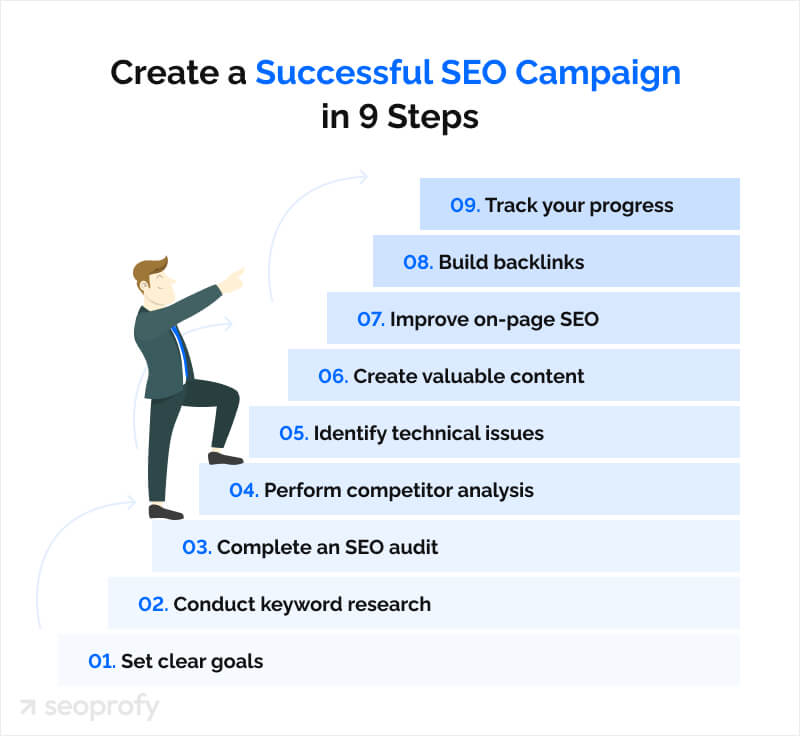
Define Clear, Measurable Goals For Your SEO Campaign
The first step is to think about what you’re trying to achieve with search engine optimization. Some common goals to consider include:
- Get higher rankings for certain keywords
- Drive more organic traffic to important pages
- Increase the number of leads and sales
- Optimize for local search (if you operate in a certain geographic area)
Having set a clear goal for your SEO campaign, you can then define what metrics are most important for you to track — be it traffic, search engine rankings, or conversions. Knowing these will help you measure progress and check if your efforts are paying off.
Additionally, consider the resources you’ll need to achieve your SEO goals, such as:
- A team of experts that specializes in technical SEO, link building, content creation or local SEO.
- SEO tools for keyword research, competitor analysis, and performance tracking.
Knowing these details will help you work out a more realistic budget for your campaign.
Conduct Keyword Research
The next step is to find keywords you’ll target in your campaigns. These are the words and phrases your potential customers use to find your products or services online.
You can use keyword research tools from Ahrefs and Semrush to find these terms. They’re not free, but the insights they provide are invaluable. With their help, you can:
- Find relevant short and long-tail keywords
- Check the main metrics for each term
- Understand the search intent behind them
One thing to remember is that effective keyword research is more about the quality of search terms, not the quantity. The goal isn’t to collect hundreds of terms but to choose the ones with the highest business potential.
In Ahrefs, you can filter keywords by intent, which helps you find commercial and transactional queries — the terms that attract people closer to making a purchase or booking. Targeting these keywords usually brings in traffic that converts better and generates more leads.
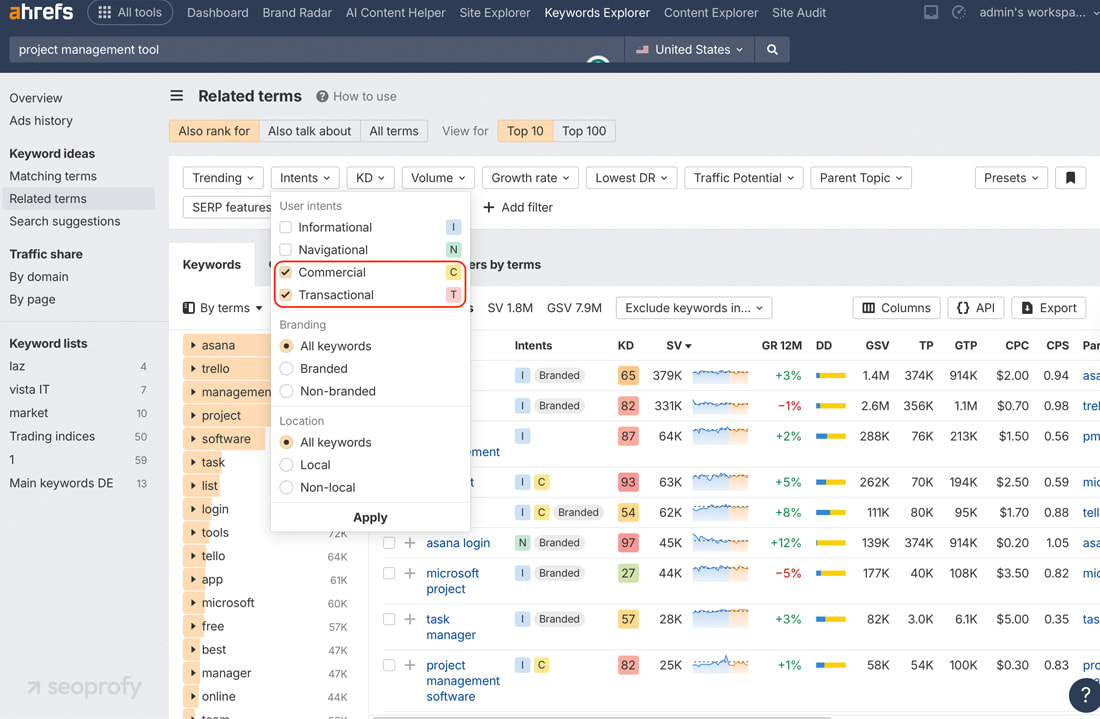
At the same time, check the search volume and target keyword difficulty score to make sure it’s realistic to rank for those terms and drive traffic to your site. For example, if you sell cat food, there are many topics you can cover in your content:
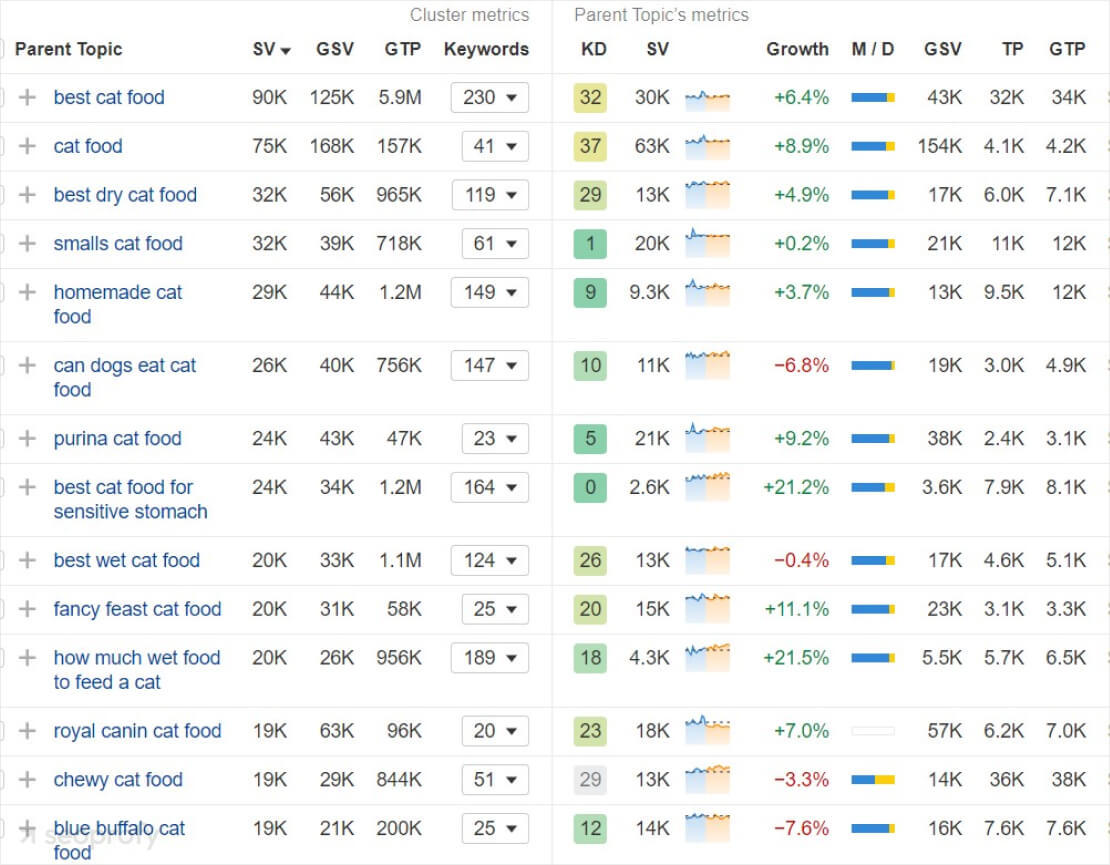
Finally, when building your keyword strategy, it’s beneficial to analyze who is already ranking for your target queries and whether it’s possible to outrank them. You can do this with the help of Google.
Use Ahrefs/Semrush (or GSC’s Links report) to compare referring domains and link quality for top pages. Google SERPs don’t expose backlink counts.
But if the difference isn’t too big, you can start working on building more backlinks. We’ll cover this in more detail later.
Run a Comprehensive SEO Audit
An SEO audit reviews how well your website is performing in SEO. Its goal is to evaluate your keywords, site structure, content, links, and technical details to better understand your current standing. If you haven’t completed an audit yet, it will set the foundation for your efforts. For example, you can check:
- Technical aspects, like how well your site performs on Core Web Vitals, mobile friendliness, indexing, and more.
- On-page elements, including your meta titles and meta descriptions, content, internal links, and heading structure.
- Off-page SEO factors, such as the quality and quantity of your backlinks.
Perform Competitor Analysis
To develop an effective SEO campaign, you need to analyze your competitors and see what strategies they are using. More precisely, this means looking closely at their keywords, content, backlinks, and on-page SEO strategies. This helps you see what drives their results and highlights gaps and opportunities you can leverage to strengthen your own SEO strategy.
There are several ways you can do a competitor analysis. You can begin with a simple check of the SERPs for your target keywords. This will give you a sense of which sites rank well and who some of your main competitors are. Pay attention not just to who ranks, but also to how they structure their web pages — headings, sections, internal links, and calls to action often influence performance.
To get even more data, use tools like Ahrefs to analyze their top-performing pages. Check out what keywords they rank for, the content they post, and who links to them. This will give you an idea of what you can improve or capitalize on.
You could check, for instance, whether they rank for some long-tail keywords that you missed or if there is an opportunity to target some highly relevant search terms that they’re not fully optimizing. Here’s an example of competitor analysis for the keyword group “law firm SEO services”:
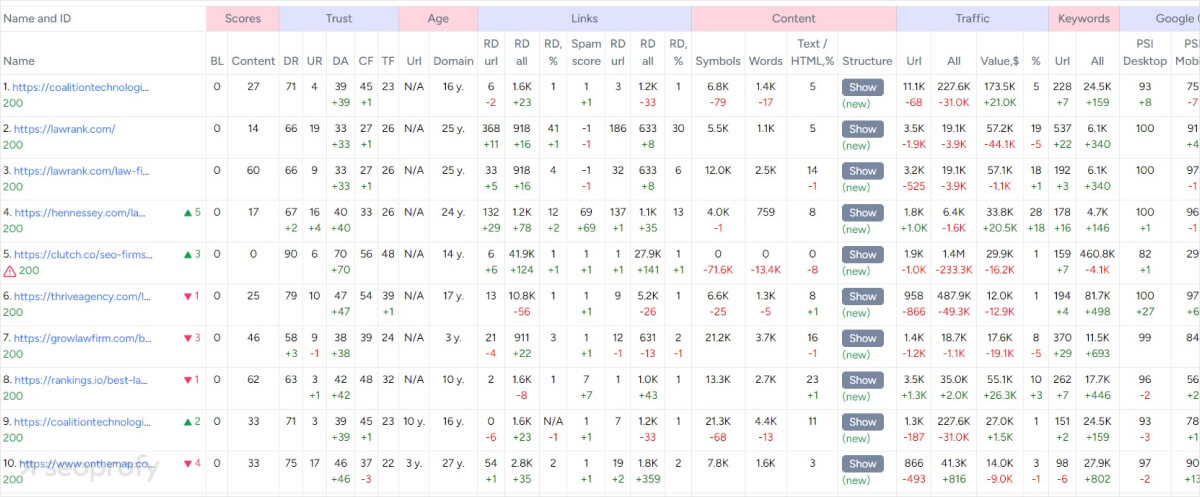
Next, you can look at the types of content they’re creating for their SEO campaigns and whether they focus on long guides, short articles, or videos — and how often they publish. You can use this information to figure out what resonates with your shared audience.
Finally, identify which sites are linking to your competitors. Reach out to these sites to build relationships and earn backlinks for your own website.
At our SEO agency, we pay special attention to this step. We focus on studying your competitors closely and use our own analytics tool to gather necessary data. Here’s how the competitor’s backlink profile looks in our report:
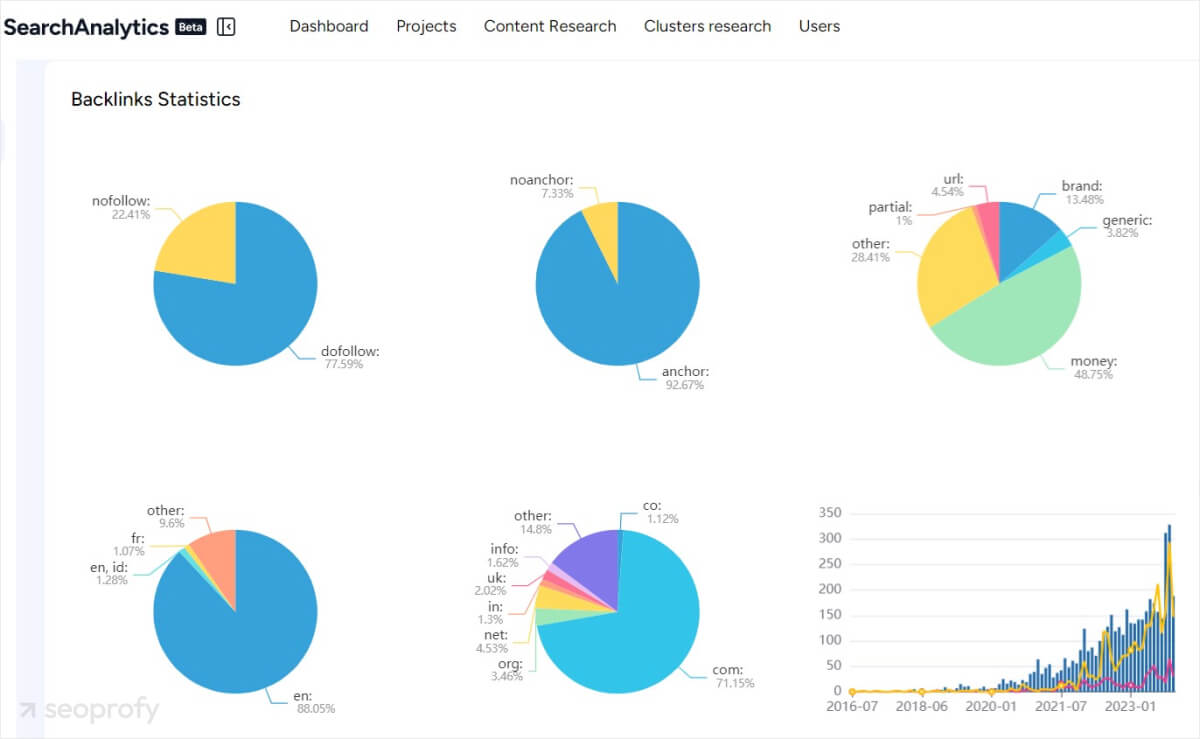
Then, we evaluate all this information to develop successful SEO campaigns with a clear roadmap and budget for your business.
Using over 300 parameters, SeoProfy analyzes every aspect of your competitors’ strategy. In this process, we use Search Analytics, an internal tool developed by our leading SEO specialists. With this software, we can help you:
- Identify keyword opportunities
- Improve your content based on theirs
- Find and target similar backlinks

Resolve Technical Issues
As you are planning your SEO campaign strategy, keep an eye on technical issues that need to be fixed. Some of the metrics you might check include:
- Site speed and ease of navigation
- Accessibility and indexing of your pages
- Missing XML sitemap and canonical tags
- Secure HTTPS connection
- Broken links and redirects
- Failing Core Web Vitals
- Poor or unclear website structure
For example, if the problem is with your site’s loading times, you can try to compress its images. Or, if you have broken links, you can use tools like Screaming Frog or Search Console to fix those links so they point to the right pages.
We recommend first checking issues that directly impact how Google crawls and indexes your site. After all, your pages need to be visible in search engines to rank and attract the right traffic.
In addition, it’s worth checking your mobile SEO. Now, more and more people use phones to browse the web, so your website should look great and work well on all devices. A mobile-friendly website improves the user experience and can result in better search rankings.
To improve technical aspects of your site, you’ll probably need to collaborate with others, like developers, or hire a team of experts who offer technical SEO audit services, as they have the expertise to quickly find and fix complex problems.
Publish High-Value Content That Drives Conversions
With your keywords in hand, you can start creating content. This is where you’d want to refer back to competitive research data to determine the type of content you want to produce and how often you’d like to publish it.
Additionally, while choosing the types of content for your SEO campaigns, you need to focus on the search intent of your keywords. If the intent is informational, you might create blog posts. If it is transactional, then the more appropriate choice would be service or landing pages.
Backlinko suggests that long-form, detailed content ranks better and has more chances to earn backlinks. Therefore, if your goal is to earn more links, you can focus on producing in-depth materials, like data or guides, that other websites would want to link to.
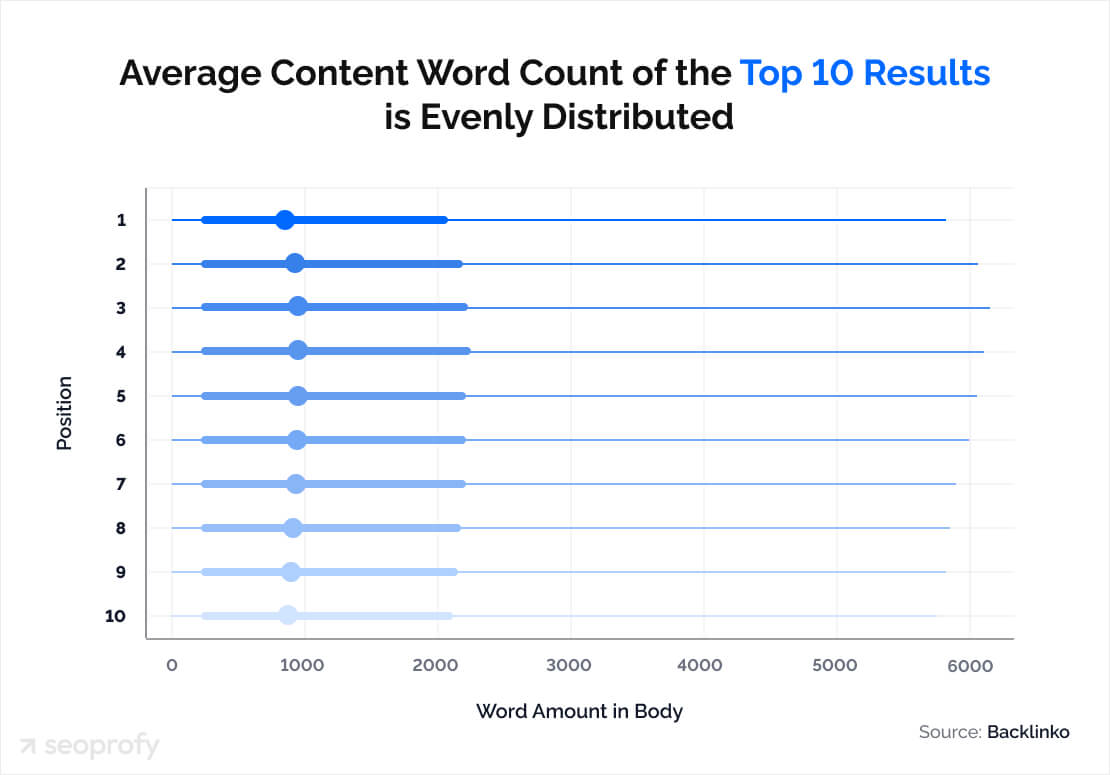
You also have to make sure that the copy you are adding to your site is actually useful to your target audience and not just keyword-stuffed. According to Google’s Search Quality Evaluator Guidelines, Google’s E-E-A-T principles (Experience, Expertise, Authoritativeness, Trustworthiness) aren’t a direct ranking factor, but Google’s systems tend to reward pages that demonstrate them—especially on YMYL topics.
Outside of their guidelines, Google released a core update back in March 2024 that further extended its focus on helpful content. Sites that were hit by this update have seen large drops in traffic and rankings, some even up to 40%.
This explains how important it is to check the accuracy of your content. It’s even better if your copy is written or reviewed by experts within the niche who can show that expertise on your webpage.
Optimize On-Page SEO (Titles, Meta, Internal Links)
The primary goal of on-page SEO is to optimize your web pages and other elements on your site, like titles, headings, meta descriptions, internal links, images, and content structure, so search engines can better understand what your pages are about and rank them higher for relevant queries.
Good on-page SEO practices — such as using clear headings, easy navigation, and fast loading times — create a better user experience. When visitors enjoy their time on your site, they stay longer, which tells Google that your site is valuable. It will eventually lower the bounce rate and lead to more organic traffic to your site.
Another important element of on-page SEO is internal linking. Internal linking spreads SEO value within your website and can even take users to other relevant pages. While adding internal links, you should use descriptive anchor text to let the visitors understand where the link will actually take them.
Here are some additional tips to consider:
- Optimize your meta tags and headings with target keywords
- Make sure your URLs are clean and descriptive
- Keep your site responsive on both desktop and mobile
Earn Quality Backlinks
Ahrefs’ study shows that the more quality backlinks a website has, the better its chances of ranking higher and getting organic traffic. This makes off-page SEO strategies a key element for a search engine optimization campaign.
The backlinks you get from other reputable sites signal to Google that your site is reliable and authoritative, which improves your credibility. What’s more, 92% of marketing specialists believe that link building will remain a key ranking factor in the next five years.
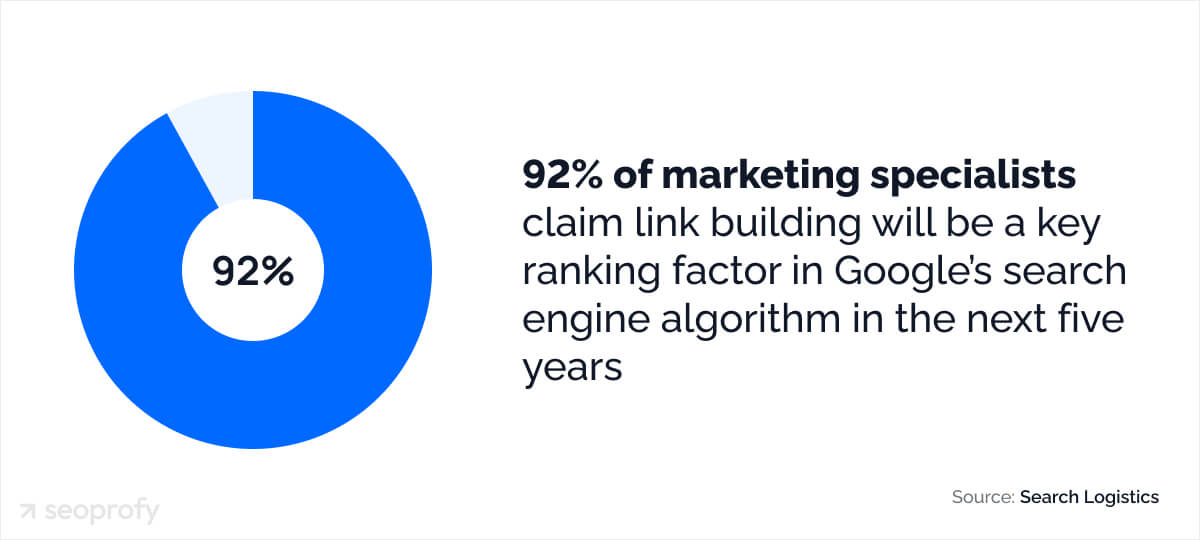
When you work on your SEO campaign objectives, focus your link building efforts on your most important pages. Start with the backlink gap analysis to see how your core pages compare to those of your competitors. You can use tools like Ahrefs or Semrush to do this.
Once you see the difference in links, think about how you can pitch your content or business to the same sites. You can also build relationships with others in your industry, collaborate on projects, or offer expert quotes to improve your chances of earning valuable links.
Avoid link schemes (paid links, large-scale guest posts with exact-match anchors, and link exchanges). They violate Google’s spam policies and risk demotion.
Track Your SEO Campaign’s Progress
After you launch your SEO campaign, it is crucial to follow up on the results of your digital marketing efforts. To check how well your campaign performs, look at the KPIs you set earlier. The best SEO tools for this step are Ahrefs, Google Analytics 4, and Google Search Console, as they will give you the most precise data about the progress.
With Google Analytics, you can track changes in organic traffic, new users, conversions, and page performance. You can also link it with your Google Search Console to see additional data like impressions and overall visibility in search results.
For more detailed keyword tracking and additional SEO tasks, paid tools like Ahrefs or Semrush can be helpful. These platforms offer in-depth ranking reports, backlink analysis, and content evaluation features.
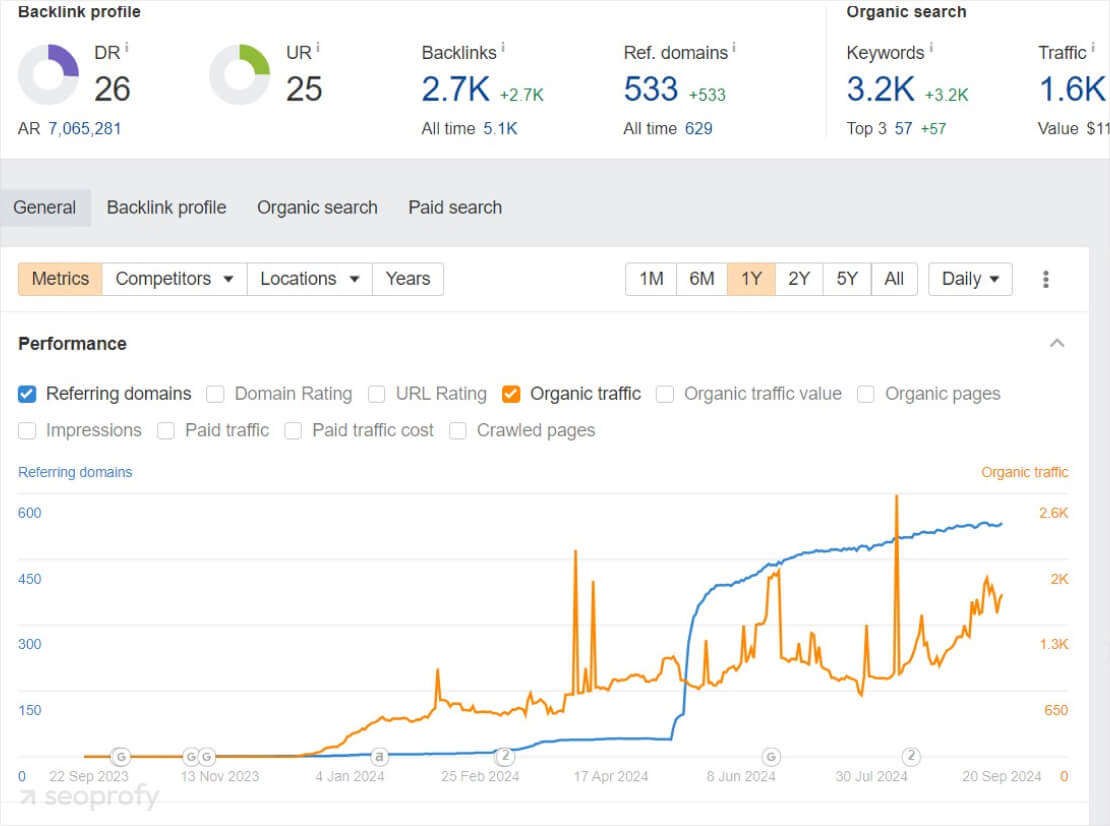
As you look at the reports throughout your SEO campaign, try to answer these questions:
- Are your keyword rankings improving?
- Are the pages you’ve optimized getting more traffic?
- Are your important pages getting more conversions?
Monitoring your SEO performance will help you understand if your hard work is paying off. Remember, though, the SEO timeline can vary, so it might take time to see the first improvements.
In your reports, look at both positive and negative indicators. While improvements in rankings and traffic are gratifying, metrics such as high bounce rates or low click-through rates can show areas for enhancement. Often, these issues open up opportunities for optimization.
When you work with agencies, they usually provide regular reports to demonstrate the impact of their SEO campaigns. These summaries offer a comprehensive view of the relevant SEO metrics, with a clear picture of your progress.
Real-World SEO Campaign Example (SaaS)
For one of our SaaS projects, we grew monthly organic traffic from 22K to 68K in 16 months (+209%). Figures verified in Ahrefs and GSC (screens below). The client reached out to us in 2022 to find new growth opportunities. At that point, the project was growing slowly — organic search traffic had plateaued at around 22K visits per month, and most commercial pages struggled to attract qualified leads.
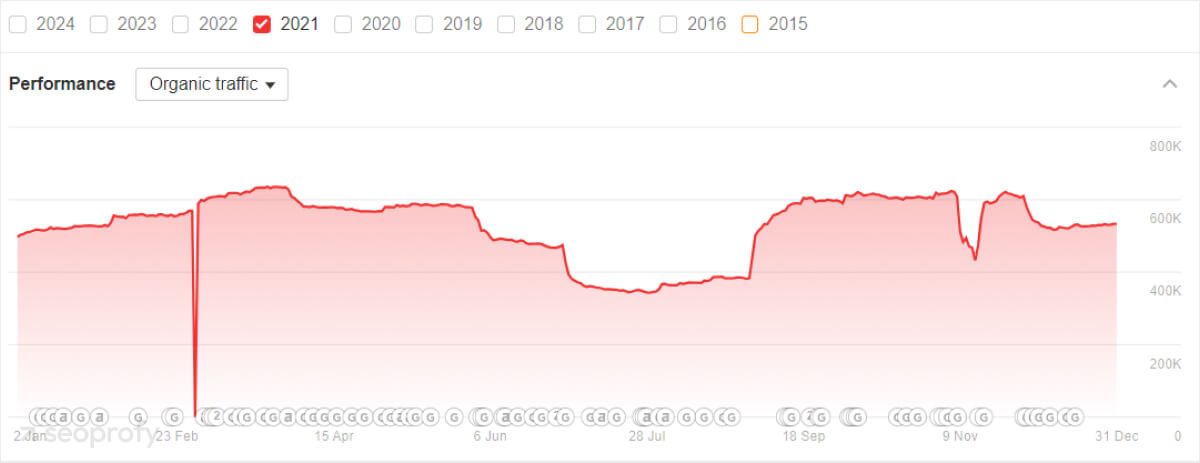
We started with a full SEO audit to understand the state of the site. The biggest problems were around technical SEO, content structure, and backlink profile.
Since the site had more than 3 million pages, our team came up with an SEO strategy that prioritized areas with the highest revenue potential. Here’s what we did:
- Fixed technical issues (page speed, 3xx/4xx, canonicals, internal linking)
- Improved content (duplicate H1s, thin pages, cannibalization)
- Focused on high-converting categories and keyword clusters
- A small, agile SEO team executed the strategy.
The results came gradually but steadily. Within 16 months, organic traffic for the priority category grew from 22K to 68K monthly visitors — a 309% increase, verified in both Ahrefs and Search Console.
Ahrefs:
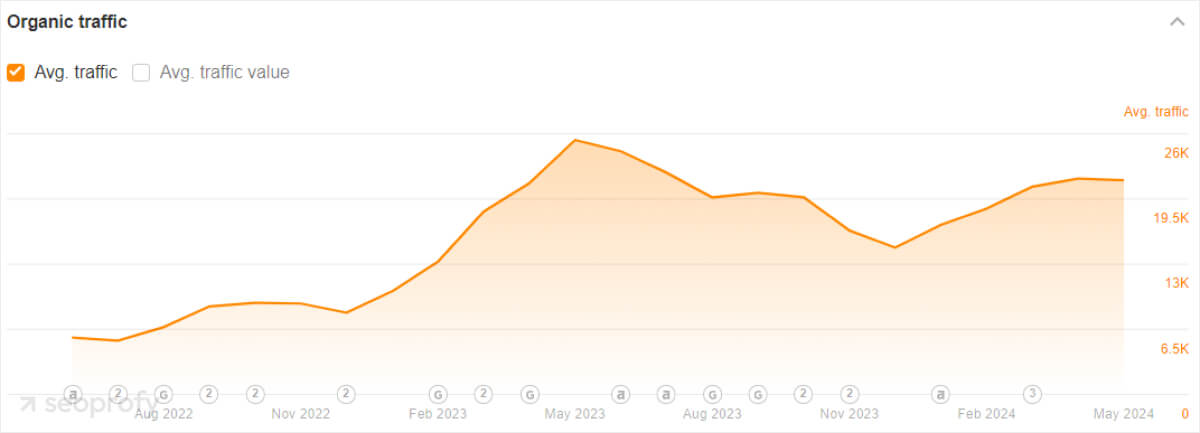
GSC:

This growth came directly from improving commercial pages that drive revenue, proving how a structured SEO campaign strategy can move business results forward.
Ready to Start Your SEO Campaign?
We’ve covered all the key elements of building SEO campaigns, and now you’re equipped to apply that knowledge in your strategy. But instead of doing it all by yourself and hoping for the best, why not partner with a data-driven SEO agency that has a proven track record of success?
At SeoProfy, we use in-house and industry-leading tools to gather data and optimize your website’s visibility. Our team will provide full support throughout the project and send you timely responses, updates, and reports on your progress.
We’ll also track your KPIs and adjust tactics to make sure our strategies stay effective and deliver the results for your business. You’ll stay in the know in every aspect of your campaign and see firsthand how our strategies directly influence your ROI.
Interested in learning more? Schedule your free SEO campaign consultation today.









